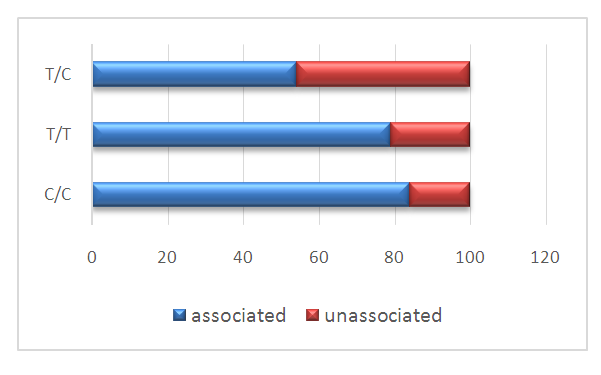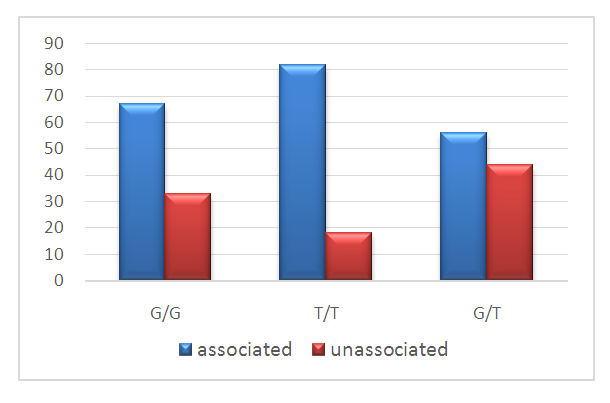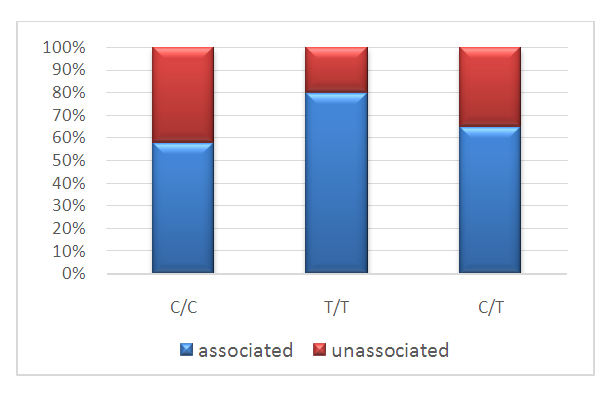-
Paper Information
- Next Paper
- Previous Paper
- Paper Submission
-
Journal Information
- About This Journal
- Editorial Board
- Current Issue
- Archive
- Author Guidelines
- Contact Us
American Journal of Medicine and Medical Sciences
p-ISSN: 2165-901X e-ISSN: 2165-9036
2021; 11(11): 825-829
doi:10.5923/j.ajmms.20211111.17
Received: Nov. 6, 2021; Accepted: Nov. 22, 2021; Published: Nov. 28, 2021

Pharmacotherapy of Chronic Gastritis Against the Background of the Influence of Allelic Variants of the CYP2C19 Gene
Ochilov Alisher Kamilovich
Bukhara State Medical Institute Named after “Abu Ali Ibn Sino”, Department of Pharmacology and Clinical Pharmacology, Uzbekistan
Correspondence to: Ochilov Alisher Kamilovich , Bukhara State Medical Institute Named after “Abu Ali Ibn Sino”, Department of Pharmacology and Clinical Pharmacology, Uzbekistan.
| Email: |  |
Copyright © 2021 The Author(s). Published by Scientific & Academic Publishing.
This work is licensed under the Creative Commons Attribution International License (CC BY).
http://creativecommons.org/licenses/by/4.0/

The article notes that pharmacotherapy taking into account the patient's genotype is a young direction that contributes to improving the safety and effectiveness of treatment with proton pump inhibitors. Determination of the patient's genetic affiliation by polymorphisms of MDR-1 and CYP2C19 genes allows to initially determine the tactics of treatment with proton pump inhibitors in patients with acid-dependent diseases. The article discusses the results of a genetic study of patients with chronic gastritis, depending on the association with H. pylori in the Bukhara region by polymorphic markers T3435C, G2677T and C1236T of the MDR-1 gene. It turned out that in the present region, chronic gastritis associated with Helicobacter pylori prevails in patients with the C/C genotype according to the polymorphic marker T3435C (82%).
Keywords: CYP2C19 gene, MDR1 gene, Cytochrome P450, Gene polymorphism, Chronic gastritis, Polymorphic markers T3435C, G2677T and C1236T of MDR-1 gene, Personification of pharmacotherapy
Cite this paper: Ochilov Alisher Kamilovich , Pharmacotherapy of Chronic Gastritis Against the Background of the Influence of Allelic Variants of the CYP2C19 Gene, American Journal of Medicine and Medical Sciences, Vol. 11 No. 11, 2021, pp. 825-829. doi: 10.5923/j.ajmms.20211111.17.
1. Introduction
- Chronic gastritis occupies a central place among stomach diseases. Chronic gastritis remains a social and public health problem in both developed and developing countries. In countries with developed statistics, it is recorded in 80-90% of patients. This is the main reason affecting the socio-economic status of people, their health behavior and living standards such as lifestyle, living conditions, behavior and habits [1,6]. Globally, gastritis affects 50.8% of the population of developing countries. At a lower level, 34.7% of the population in developed countries had health problems due to gastritis. Compared with developing countries, the prevalence of gastritis has decreased markedly in developed countries. However, he remained a serious health problem [4,8]. The analysis of statistical data for the Republic of Uzbekistan showed that 56.6% of patients with gastrointestinal tract accounted for the adult population, 34.5% for children under the age of 14, 8,9% of all patients with gastrointestinal tract [2,5,18].It was found that in Uzbekistan over the past 10 years (2007-2017), the number of patients with gastrointestinal diseases has increased by 22.4%. The annual average increase was 2.65%. A high annual average increase is observed in the city of Tashkent, and a negative increase in the increase in gastrointestinal diseases is observed in the Bukhara region. In the city of Tashkent, the increase in the number of patients is due to the increase in morbidity among children and adolescents, in the Samarkand, Tashkent and Syrdarya regions, the increase in the number of patients is observed at the expense of the adult population [7,11,20,26].The importance of chronic gastritis as a serious disease is largely underestimated in clinical practice, although the role of gastritis in the pathogenesis of common peptic ulcers and stomach cancer is obvious. It can be estimated that millions of premature deaths may occur worldwide every year due to cancer and ulcers, which are the consequences of chronic gastritis [3,9,13].The prevalence of chronic gastritis has decreased markedly in developed countries over the past decades. However, chronic gastritis is still one of the most common serious pandemic infections with serious fatal consequences such as stomach ulcers or stomach cancer [10,15].The development of chronic gastritis is influenced by etiological factors that are exogenous and endogenous in nature. Particular importance is attached to the etiological role of Helicobacter pylori, since more than 90% of HCG is associated with this infection. In Ethiopia, a systematic review conducted by Marcis et al [12,28]. It was indicated that 53% of people aged 54 to 61 years suffered from gastritis due to H. Pylori infection. In addition, in Nigeria, 40.7% of children aged 6 to 10 years suffered from gastritis caused by H. Pylori. It was revealed that Uzbekistan belongs to the regions with a high degree of infection of the population with H. Pylori infection – 80%. In this regard, all patients with hCG should include antimicrobial drugs in pharmacotherapy. The purpose of therapy and the success of eradication treatment depends on the effectiveness of the antibacterial drug on H. Pylori, and on the degree of suppression of acid secretion [14,25]. The drug response is influenced by both clinical factors, such as age, gender, kidney and liver function, concomitant therapy, and genetic factors, the degree of influence of which varies widely for different drugs. Genetic polymorphisms can affect various pharmacological reactions: absorption, distribution, metabolism.Protein-transporter - P-glycoprotein (Pgp) plays an important role in the pharmacokinetics of drugs. Pgp (from the English permeability — permeability) localizing in the intestinal epithelium, efflux of medicinal substances - its substrates - into the intestinal lumen, thereby reducing their absorption. In hepatocytes and renal epithelium, it mediates the excretion of xenobiotics into the lumen of bile capillaries and renal tubules, respectively, and in histohematic barriers ensures their impermeability to lipophilic substances. The functional activity of Pgp can change (increase or decrease) under the influence of a number of drugs. Pgp is a protein encoded by the MDR1 gene - a representative of the MDR (multi drug resistance gene) gene family - responsible for resistance to various drugs [19,22]. The product of the MDR1 gene - P-glycoprotein is a transmembrane pump and affects the action of many drugs. Polymorphism in the MDR1 gene can affect the pharmacokinetics of many drugs. With the combined use of Pgp substrates with its inhibitors, the concentration of substrates in the blood plasma increases, which can lead to the development of undesirable drug reactions. Conversely, the combined intake of substrates and inducers of the transporter protein leads to a decrease in the concentration of substrates in the blood, and, as a consequence, to a decrease in their therapeutic effectiveness [27,30].One of the factors determining the effectiveness of antisecretory therapy of HCG is the intensity of metabolism of proton pump inhibitors. At the same time, the genetic factor is a significant source of interindividual differences in the metabolism of drugs [16,23]. The metabolism of drugs of the proton pump inhibitor group is carried out mainly by the enzyme CYP2C19 of the cytochrome P450 superfamily.The implementation of genetic research has now ceased to be an object of purely fundamental science. Understanding the genetic factors underlying an individual response to a drug gives clinicians hope for the possibility of personalizing therapy and minimizing the risk of side effects. The principles of HCG pharmacotherapy may be standard, but the treatment of the disease cannot be the same for all patients, it must be personalized. This approach is based on the genetic characteristics of the patient [17,24].In modern medicine of our state, a number of measures are being carried out to improve the quality of medical care to the population. The action strategy for the five priority areas of development of the Republic of Uzbekistan in 2017-2021 defines such tasks as "... the introduction of a set of measures to improve and strengthen the health of the population, reduce morbidity, prevent genetic diseases and increase life expectancy ...". The solution of these tasks contributes to the qualified treatment of various diseases, the improvement of methods and approaches to pharmacotherapy using modern technology, identifying the genetic affiliation of each patient for personalized medicine [21,29].
2. Materials and Methods
- A comprehensive examination of 104 patients with chronic gastritis who were on inpatient treatment and observation in the Bukhara regional Medical Center was conducted. The control group consisted of 96 healthy people who had no history of pathology from the digestive tract, living in the Bukhara region, corresponding by gender and age to the examined group of patients with chronic gastritis.The age of patients with chronic gastritis ranged from 18 to 67 years. At the same time, it should be noted that women predominated among patients with chronic gastritis.The initial stage of our work was the selection and optimization of the system of oligoprimes for the detection of polymorphism rs4244285 of the gene SUR2C19 by polymorphic marker G681A. The nucleotide sequences of the rs4244285 polymorphism detection of the SUR2C19 gene were selected using the Oligo v.6.31 program (Molecular Biology Insights Inc., USA) and synthesized at Syntol LLC and NPFLitech” (Moscow).The adaptation of primer systems for standard PCR analysis was carried out using PCR analyzers “Appliedbiosystems 2720” (USA) and Rotor-Gene 6000 (Corbett Australia). For amplification, a reaction mixture with a volume of 25 µl was used, which contained 2.5 µl of 1 OxTaq buffer (67 mMtris-HCl (pH 8.8), 16.6 mM (NH4)2S04>, 2.5mm MgCl2, 0.01% Tween-20), 0.1 µg of genomic DNA, a mixture of dNTP (dATP, dGTP, dCTP, dTTP of 200 µm each), 1 unit. Termusaquaticus DNA polymerase (manufactured by Silex, Moscow) and 5-10 pM locus-specific oligonucleotide primers. The temperature-time parameters were changed depending on the pairs of oligoprimes.To detect rs4244285 of the SUR2C19 gene: preliminary denaturation - 940C (1 min. 1 cycle), 35 amplification cycles: 930C (10 sec) - denaturation, 640C (10 sec) - annealing of primers, 720C (20 sec) - elongation, and final synthesis 720C (1 min. 1-cycle), 10 min storage.Polymorphic regions of the SUR2C19 gene were detected using PCR-SSP.The specificity and number of amplified fragments were checked by electrophoresis in agarose gel.
3. Result and Discussion
- Individual variability of the drug response is one of the main problems in modern clinical practice. The genetic variability of the genes encoding these enzymes, the patient's genotype plays an important role in the manifestation of individual sensitivity to drugs.Using a modified detection method, we investigated polymorphisms of the MDR-1 gene: polymorphism T3435C of the MDR-1 gene, which has variants of the C/S, T/T, T/S genotypes; polymorphism G2677T of the MDR-1 gene, which has variants of the G/G, T/T, G/T genotypes and polymorphism C1236T of the MDR-1 gene, which has variants of the C/S, T/T, C/T genotypes.It should be pointed out that in the structure of the group of patients with chronic gastritis studied by us, living in the Bukhara region, depending on the association with Helicobacter pylori (Figure 1), patients with the polymorphic marker T3435C of the MDR-1 gene had more than 84% of patients with the C/C genotype, and 79% of patients with chronic gastritis associated with Helicobacter pylori had the T/T genotype and more than 54% of patients were carriers of the heterozygous T/C genotype, who had identified chronic gastritis associated with Helicobacter pylori. However, chronic gastritis not associated with Helicobacter pylori in patients with a similar genotype was found in 46% of cases.
 | Figure 1. Frequency of distribution of polymorphism genotypes T3435C MDR-1 gene in chronic gastritis, depending on the association with Helicobacter pylori |
 | Figure 2. Frequency of distribution of genotypes of polymorphism G2677T MDR-1 gene in chronic gastritis, depending on the association with Helicobacter pylori |
 | Figure 3. Frequency of distribution of genotypes of polymorphism C1236T of MDR-1 gene in chronic gastritis depending on association with Helicobacter pylori |
4. Conclusions
- Thus, the results of research show that in order to obtain a complete pharmacotherapeutic effect, the doctor must have information about the patient's genotype. Such patient data helps the doctor optimize the chosen treatment plan and, most importantly, select the dose and treat the patient effectively and safely.Since the human genetic apparatus is individual and unique, we believe that such information about the patient contributes to the individualization of treatment, that is, the personification of pharmacotherapy, which will serve as the basis for safe and highly effective treatment, which in modern medicine is considered relevant and a requirement of the time.
 Abstract
Abstract Reference
Reference Full-Text PDF
Full-Text PDF Full-text HTML
Full-text HTML